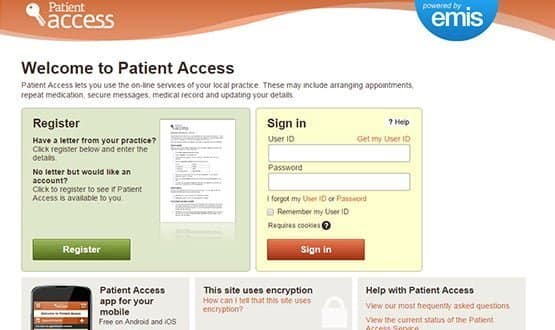When it comes to IT solutions that make life better for patients, an app for GP appointment booking has to be close to the top of the list.
In a matter of a few clicks on a smartphone, patients can potentially view all the available appointments at their GP practice and choose the appropriate one – at any time of the day or night.
Compare that to the process of waiting for the surgery to opening, making multiple attempts to get through, and then negotiating with a receptionist and the benefits are obvious.
The success of Patient.co.uk a division of the Emis Group, in delivering such a system made it the winner of the excellence in mobile healthcare category at the EHI Awards 2014.
From PC to phone
Emis was a trailblazer for GP online services a decade earlier when it launched its Patient Access service for practices which saw more than a million transactions a month completed over the web by 2012. It therefore made sense for it to develop the service further as technology changed.
Tim East, product manager for Emis Group, says: “Patients had been using the desktop version since 2003, but by early 2013 more and more people were using mobile devices and we wanted to provide an equivalent experience on a smartphone.”
Emis began developing a version of the system that would work on iOS and Android. After positive feedback from trial practices, the company gave the app its public launch in summer 2013.
By March 2014 the system had been downloaded 45,000 times by Android users and 83,000 times by Apple owners.
Figures for December 2014 show that this has now risen to 170,000 downloads for Apple users and 103,000 downloads for Android users. A successful log-on has been registered 2.5 million times for Apple users and 2.1 million times for Android users.
East adds: “There seems to be constant appetite for it and it hasn’t plateaued out in terms of download figures.”
Contracts drive take-up
Patient Access is available to all GP practices using Emis Web. The requirement in the 2014-15 GP contract for practices to offer online appointment booking, repeat prescriptions and access to summary information in their patient record (as a minimum) has helped to stimulate uptake among practices that might previously have been unswayed by the benefits.
East says 90% of Emis Web practices have now switched on GP appointment booking, 84% repeat medication requesting, and 38% medical record viewing.
He adds: “Month on month more practices are switching on online services and actually doing transactional stuff. Practices like it because it is convenient for patients and also because it frees up receptionists to spend more quality time with patients.”
The app was promoted to practices already using Patient Access via the desktop version and advertised to patients through Emis’s health and wellbeing site Patient.co.uk.
Policy backs the direction of travel
East says the app’s advantage over the desktop version is that it allows users to access the services anywhere, in tune with the way many services are now accessed by consumers. “I was on the train the other day and more people had a mobile device in their hand than did not.”
The app means patients can also easily share information if they choose to, for example showing their repeat medication list or even information from their medical record to hospital clinicians.
Again national policy, in the shape of the 2015-16 requirement for patients’ to have online access to all coded information in their GP record, is encouraging more practices to make the medical record viewer available to patients.
East says practices can also configure the viewer to their own requirements, choosing whether to make elements such as problems, letters, test results and immunisations available to patients. He adds: “So far a lot of practices have switched on the Summary Care Record view, which is medications and allergies.”
Apple and wearables
Last summer, Emis developed the app further by making its Apple version integrated with Apple’s HealthKit. This means that patients using iOS 8 can have their own personal health record through the app, and can add information collected through third parties such as height, weight and distance walked.
They can then use the Patient Access app to share this information with their GP practice if it is an Emis Web user. East says just over 4,000 patients have started to record their data through the device, and Hillingdon Clinical Commissioning Group has become the first area in the country to roll it out.
Next on the list for the project is the release of the API for the app as part of the revamped GP Systems of Choice programme in 2015. This will mean any third parties will then be able to use the API and will mean users are likely to benefit from innovations driven by this greater competition.
The company is keen to stay ahead of the curve and East says it will be looking to develop the personal health record service for Android users as well as looking at developing the evidence-base for the benefits of patients sharing information.
With this eye on the future, East says the EHI Award was a welcome reward for what has already been achieved.
He adds: “Because we are always looking ahead and working on what’s coming next it is nice for the whole team to get external recognition that we have actually achieved a lot with the app in getting it so far.”
The chance of the team resting on their laurels seems highly unlikely however. East adds: “The mobile platform is one of the most innovative areas in healthcare IT at the moment, so it’s a really exciting space to be working in.”

